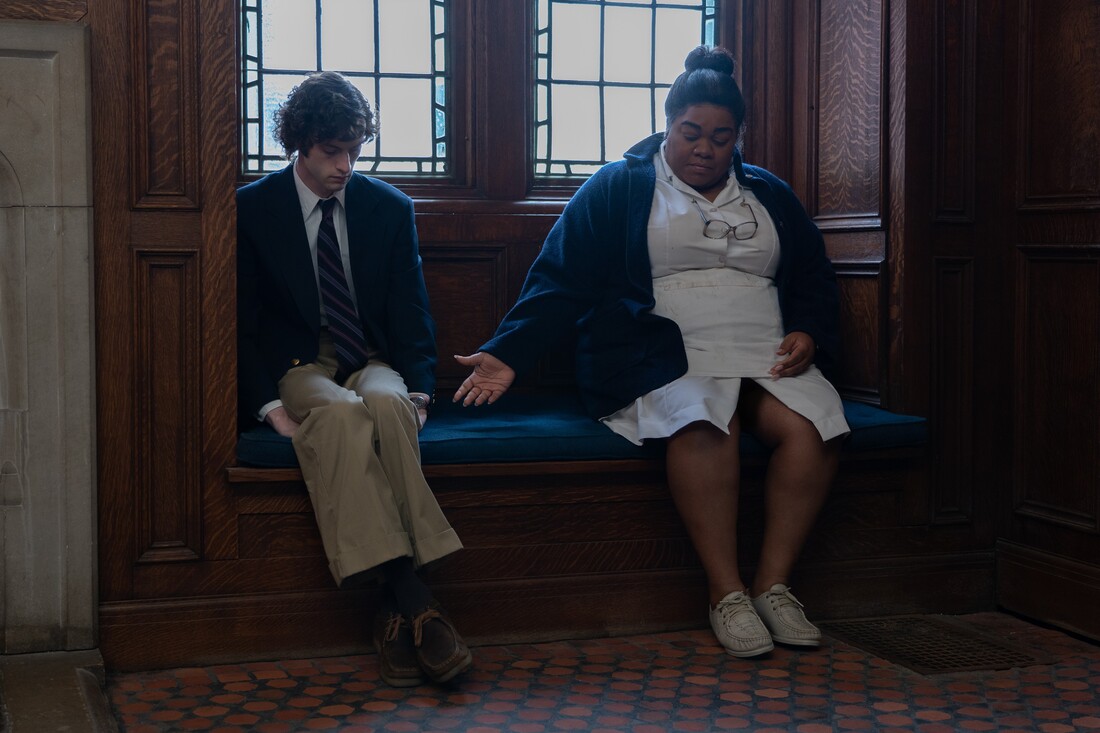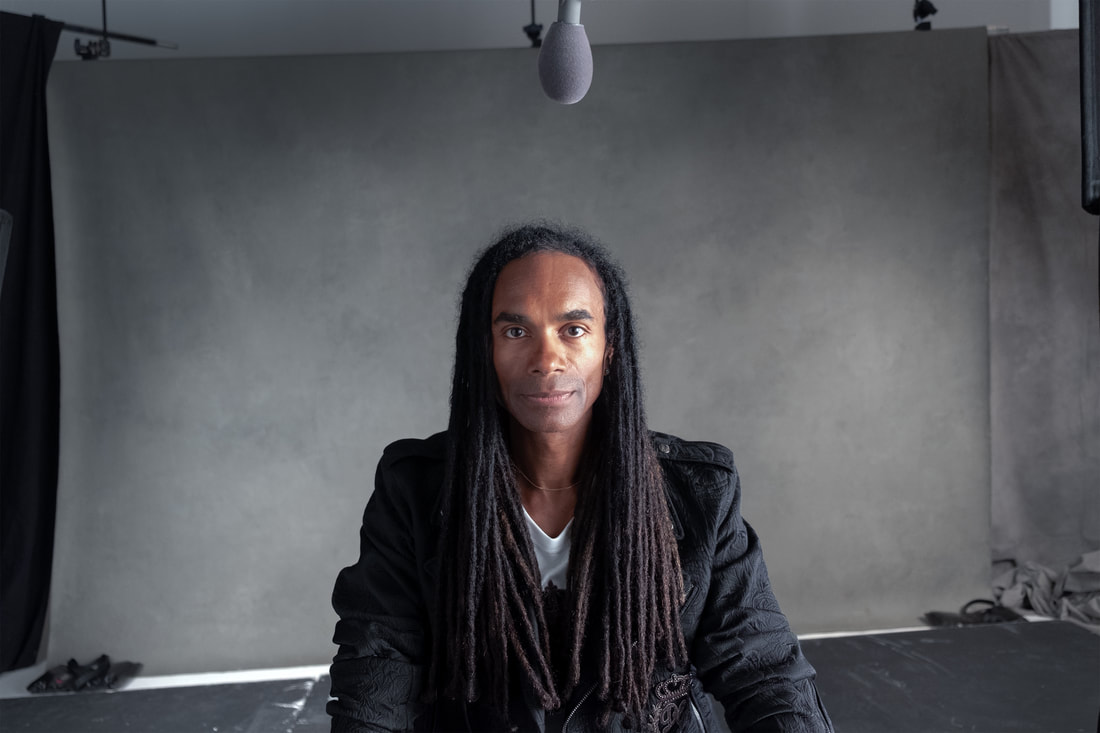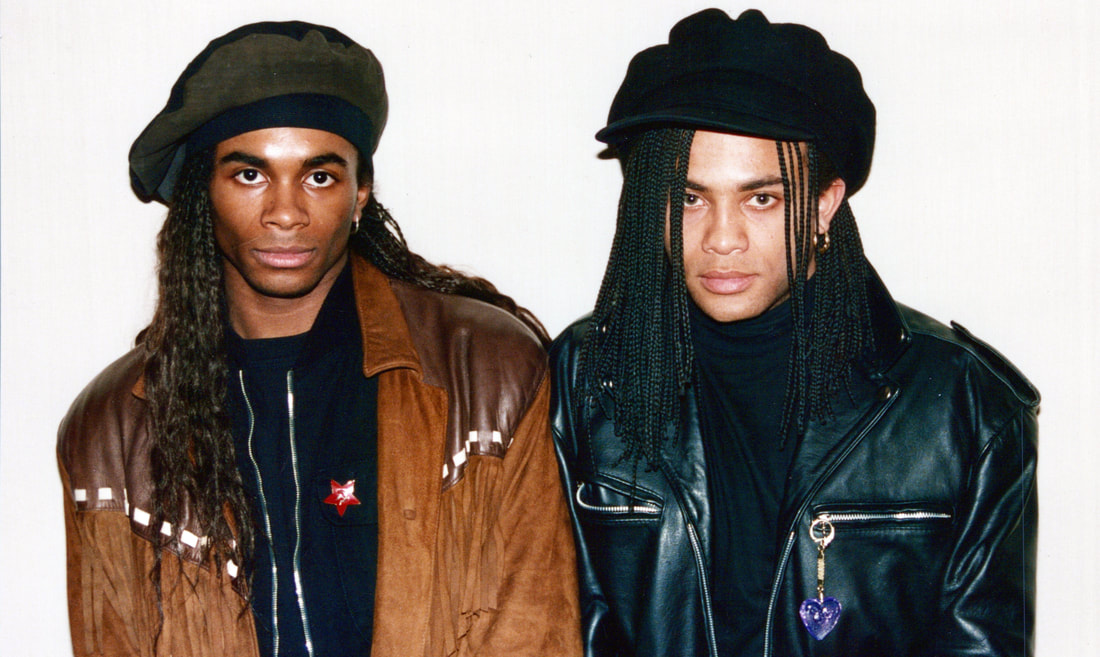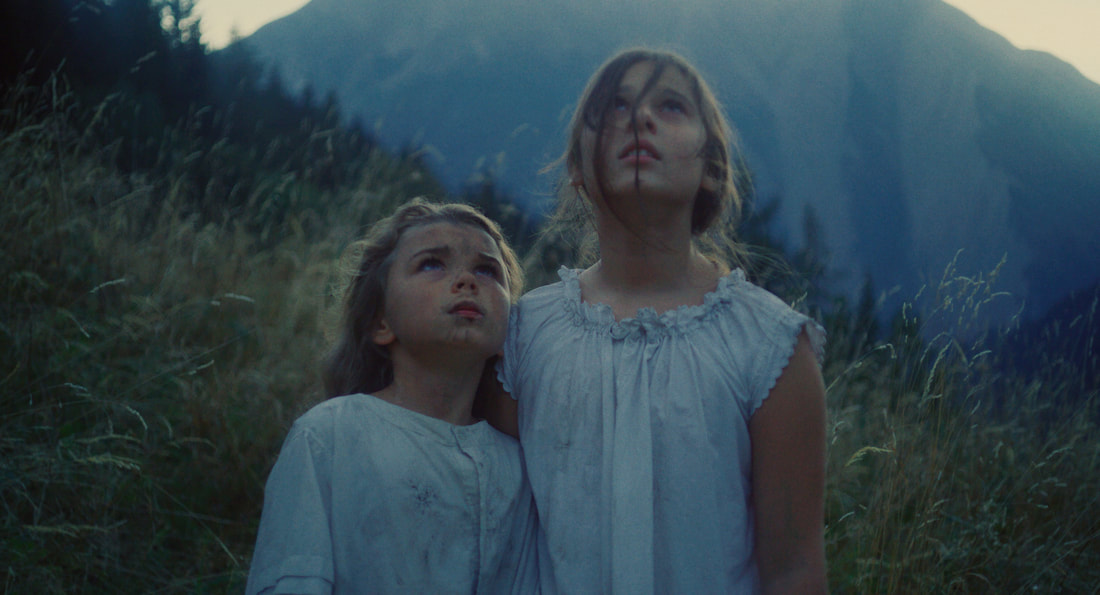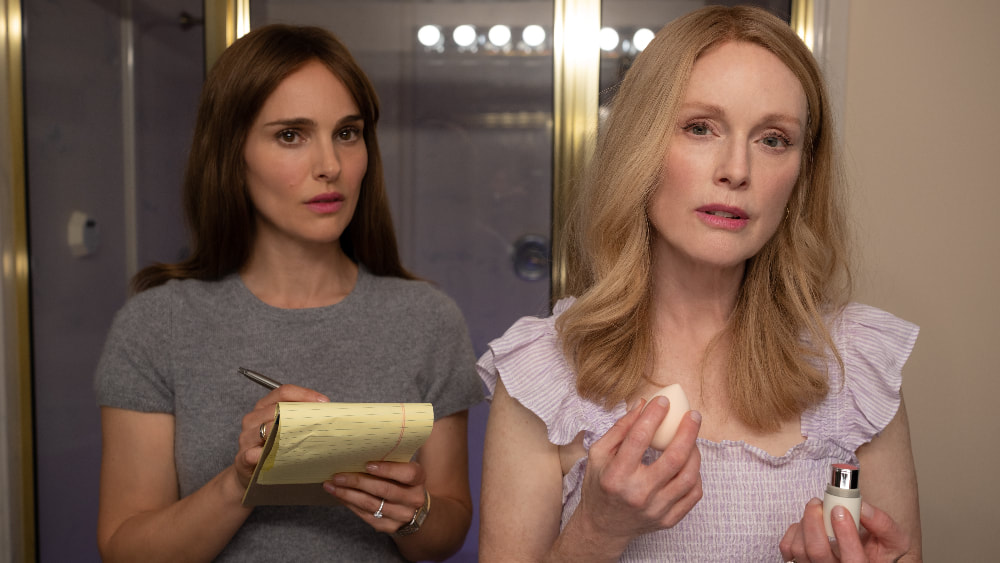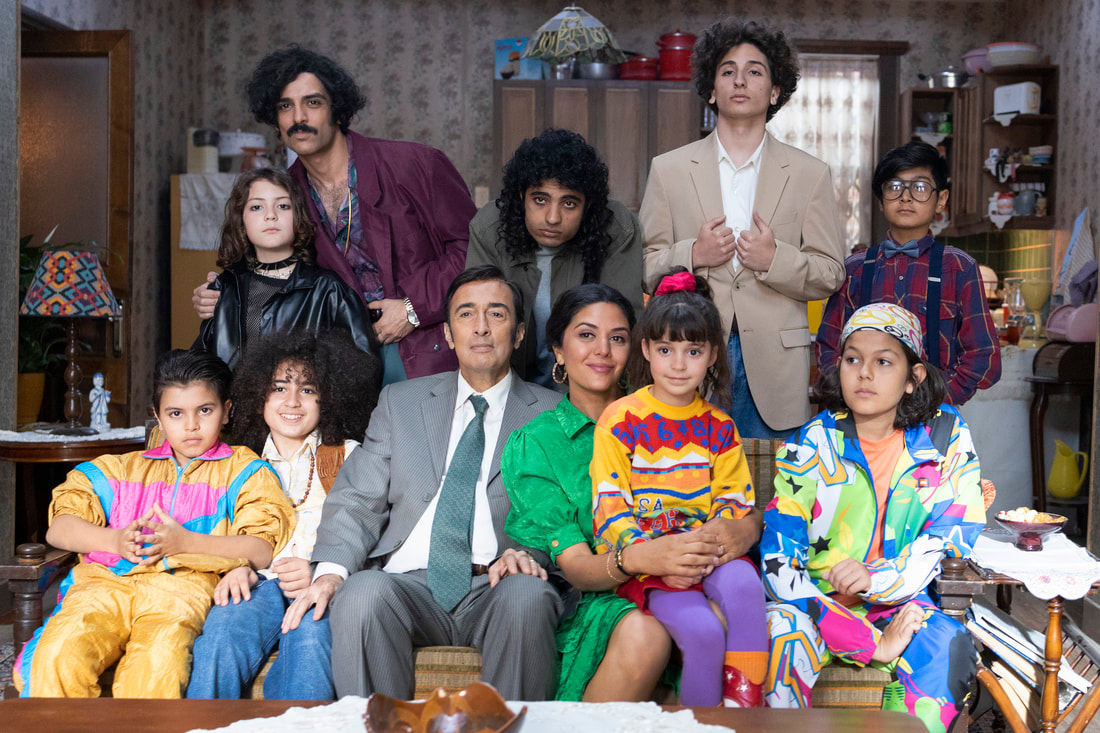|
Review by Tatiana Miranda When it comes to queer cinema, stories tend to focus on the youthful side of LGBTQ+ identities. Often, they feature a sense of coming-of-age and scenes of coming out to friends and family. While All of Us Strangers doesn't *not* do those things, it does them in a re-inventive way that says more about the cultural understandings of queerness, rather than one personal identity. Based on the film's promotional images and beloved leading men, All of Us Strangers might seem like your average sad gay romance. Although the movie is both sad and gay (How could it star Paul Mescal and not be a little depressing?), the romance aspect is probably the least moving part of the film. Even with Mescal and Andrew Scott's undeniable on-screen chemistry, their characters' love story plays second fiddle to the main plot at hand. Loosely based on the 1987 Japanese novel Strangers, the movie centers around 40-something-year-old screenwriter Adam (Scott), as he routinely revisits his childhood home in an attempt to reconnect with his long-deceased parents. Although he starts this routine as a way to gain inspiration for his writing, it slowly turns into a mode of therapy, as he communes with the imagined versions of his mother and father. Even though All of Us Strangers is probably one of the more hopeful queer films to come out of late, it is still intensely emotional and full of a sense of loneliness that is both personal to the characters and also a reflection of the realities of being gay without a community to share that revelation with. As Adam grows closer to Mescal's character, Harry, he reveals his identity to his parents, imagining how they might react to him coming out.
The differences in Harry's and Adam's individual gay identities are also incredibly significant. Due to his age and personal trauma, Adam is more reserved when it comes to romance. Meanwhile, Harry is perhaps overly flirtatious. For Harry, his outward sexuality comes easy to him, a sign of the times changing and his ability to have properly come out to his family, even if they no longer talk to him. Although All of Us Strangers is touching as a romance with incredible performances by both Scott and Mescal, as well as Claire Foy and Jamie Bell as Adam's parents, its emotional aspects come from its unorthodox and refreshing look at navigating sexuality and coming out past your youth. Director Andrew Haigh's well-thought-out adaptation, paired with editor Jonathan Alberts's masterful blending of the "past" and present, makes it an unforgettable film. All of Us Strangers screened at the 2023 edition of NewFest, which runs October 12-24. Rating: 4/5
0 Comments
Review by Dan Skip Allen I would be lying if I said I wasn't a fan of Milli Vanilli as a teenage kid. Sure, I wasn't a young teenage girl smitten with these two good-looking European guys with electronic voices. I was just an average white kid from an inner-city Massachusetts town. I just knew what sounded good to my ears. I loved all their hits, including "Girl You Know It's True" and "Blame It On the Rain" are two of their biggest hits. Little did I know they didn't actually sing these songs. I lived in an era where there were many pop stars I loved, like Michael Jackson, Madonna, Cindy Lauper, and Whitney Houston. Milli Vanilli seemed like they were going to be just another artist like these… until they started talking and doing interviews. Even as a kid, I heard something in their voices that didn't vibe with their singing voices. Although there can be a separation between speaking voices and singing voices, this duo took it to the extreme. These guys had European accents, but sang like they couldn't speak fluently in English. There was something wrong with this, I could feel it. Eventually, the news broke that these guys were a fraud. I felt better, but a lot of people didn't feel so good. The Grammy Nominating Committee felt slighted and investigated this, and found these guys guilty of not singing these songs. They said the duo had to return their Grammys. This is the first and only time this ever happened. They have lived in infamy ever since. The documentary effectively dives into how this duo fooled the world before their lie came crashing down. These two guys, Fabrice Morvan and Robert Pilatus, met while they were both struggling musicians in Europe. Frank Farian was a music producer in Germany, and he had success with one band, who he also had lip-syncing their songs to good results. They weren't stars outside Europe, though. That's the difference between them and Milli Vanilli. The latter achieved massive stardom across the pond and around the world. Like many documentaries, this one has a lot of talking heads. Filmmaker Luke Korem gives a lot of butt-hurt people the opportunity to voice their opinions. Farian isn't among those, but Oscar-nominated songwriter Diane Warren, Timbaland, and the men and women who actually did record these songs and didn't get the credit for them had their moment to get the credit they deserve. These people had a lot of informative, in-depth things to say. It was eye-opening even for me, who already knew about this story. Imagine what it's like for those who didn't know about this scandal.
We live in an era of the 24-hour news cycle, and stories like this one had their fifteen minutes of fame before news stations moved on to the next OJ Simpson, Tonya Harding, or Richard Jewell from the Atlanta Olympic bombing. Thirty-five years have gone by since this worldwide scandal took place, and the true story has yet to come out until now. Yes, these guys had a press conference confessing their guilt, and Farian broke the story to European newspapers and television stations telling the truth of who actually sang the songs, but the whole truth hasn't come out like this. This film documents everything from the horse's mouth — well, some of them, as one half of the duo tragically passed away due to a drug overdose years ago. The documentary Milli Vanilli is a good one. It delves deep into the true nature of the cost of fame and fortune. These two poor guys from Europe would do anything for fame, and they bought into the scheme by Farian, even though at first they didn't want to. Farian wasn't stupid — he knew these guys couldn't sing fluently in English. They could barely speak the language, let alone sing in it. This film documents the true story behind this fraud, but as we see, it's not all the fault of these two aspiring singers. Nevertheless, the cost is high, as the original singers didn't get their due either. This documentary effectively shows all the sides of this crazy story from the ‘80s. Milli Vanilli streams on Paramount+ beginning October 24. Rating: 4.5/5 Review by Dan Skip Allen I'm a big fan of foreign films because there are plenty of gems hiding within the sea of international cinema. One recent gem is Thunder, the Swiss submission for the Best International Feature Oscar at next year's Academy Awards. Writer-director Carmen Jaquier has a legitimate contender on her hands. Elizabeth (Lilith Grasmug) is a seventeen-year-old girl who lives in a convent in turn of the century Switzerland. When she gets word that her sister has passed away, she is told she must return home to work for her parents on their farm. The death of her sister is a mysterious one, and she starts to ask around about what happened. Jaquier has made a beautiful film with breathtaking views of the Swiss countryside and adjacent mountains overlooking the village in the film. The beautiful cinematography by Marine Atlan is perfect. In one sex scene, the wind blows the hair of the main girl as the sounds of crickets and water flowing lull in the background. I'm amazed at how all of this was captured so effortlessly. It's one of the best-looking films I've seen all year. This story was a difficult one to watch unfold, despite how beautiful it was to look at. There is a dichotomy there that is fascinating to me. While the main girl is acclimating herself back into her old life, she starts to discover what is going on in this community. Three boys who are always around start to make themselves noticed by her, so she starts to explore their relationship with her sister. There was more going on than she thought while she was gone. With this being about boys and girls, there is an underlying storyline of sexual repression. This town is in the middle of a world of ideals about Christianity and strong religious beliefs that make it hard for the boys and girls coming of age, as they get more mature, wanting to explore their sexual urges — even if they are told it’s wrong. With this being in such a location and time, you’d expect the boys to be crossing the line, but the elders are on top of things because of the last death.
There are two things in this film — besides the cinematography — that stood out to me quite a bit: the score, which had beautiful sounds that reflected the incredible surroundings, and a hidden notebook that provided narrative information for those watching the film. The director used the notebook in a way I hadn't seen before. The deceased sister narrated her own words in it and expressed her desires for sex and male companionship. This was her undoing, though. Films about the past or foreign lands can be a bit hit or miss. Sometimes, things can get lost in translation. That isn’t the case here, though. There is a clear storyline based on various factors that let the viewer come to their own conclusions on the situation in the film. Writer-director Carmen Jaquier does a great job portraying this story on screen using a couple of different techniques, including extraordinary cinematography and score. Thunder is a well-done movie with difficult subject matter. This has a good chance for awards consideration. Thunder hits theaters on October 25. Rating: 4.5/5 Review by Tatiana Miranda Todd Haynes is best known for his campy (Velvet Goldmine and Superstar: The Karen Carpenter Story) stories about forbidden love (Carol and Far From Heaven), and in his newest flick, May December, both themes are present. Or are they? Probably his most experimental film of recent years, May December teeters the line between serious drama and parody. The movie follows actress Elizabeth Berry as she visits married couple Gracie Atherton-Yoo and Joe Yoo in preparation for a movie role about their life. As is eventually revealed, in the '90s, 36-year-old Gracie had an affair with 13-year-old Joe. Even after making national headlines and Gracie having Joe's children while in prison, the two got married and attempted to move past their infamous history. That is until Elizabeth arrives and causes the family to rethink the facts of their relationship. Compared to comedy films about similar subjects — such as Adam Sandler's That's My Boy -- May December understands the seriousness of the situation and instead relies on the absurdity of the characters and their actions as a form of comedy. The first note of this is when, after a mundane statement from Gracie about not having enough hot dogs for their cookout, a dramatic piano score by Marcelo Zarvos interjects. This continues throughout the film, as several inane moments are treated as if they're shocking revelations in a true crime drama. It takes a while for viewers to determine whether this absurd directorial decision is meant to be taken seriously or not. Long after the credits roll, some are still left wondering whether May December was meant to be a dramatic story about the inhumanity behind true crime biopics or a satire thriller piece similar to the Netflix series The Woman in the House Across the Street from the Girl in the Window.
More than a critique of Gracie's extramarital and extremely illegal relationship with Joe, May December highlights the ridiculousness of how Elizabeth treats the couple for the sake of her career. Similarly to how the main characters never quite condemn Gracie's — or even Elizabeth's — actions, Haynes never gives a decisive answer as to how the audience should feel about the movie as a whole, and what it has to say about the epidemic of true crime biopics and intense method acting. Due to the film's upcoming release on Netflix, it's likely it will reach an audience affronted by how unseriously it takes itself and its sometimes confusing tonal shifts. While May December is unlikely to become a beloved classic like Carol for this reason, it provides an interesting and experimental critique of the modern Hollywood phenomena of true crime biopics. May December screened at the 2023 edition of NewFest, which runs October 12-24. Rating: 3/5 Review by Camden Ferrell Life inside of North Korea is a cruel yet enigmatic experience that most could not begin to comprehend. Their atrocities and indoctrination are things of horrifying infamy, but due to their isolated nature, there is still a troubling mystery around the lives of their citizens. Director Madeleine Gavin aims to pull back the curtain on these people as she documents several of their journeys as they attempt to defect from North Korea. This is an undeniably harrowing documentary that is one-of-a-kind and full of dramatic tension as well as profound and upsetting emotion. Seungeun Kim may appear to most as a mild-mannered Pastor, but he also spends his time aiding defectors in North Korea on their quest for freedom. This includes people like the Roh family who must travel through multiple countries to safety as well as Soyeon Lee, a defector in South Korea who is trying to get her son out of North Korea safely. These stories are told and balanced with insightful commentary and revolutionary secret never-before-seen footage from inside of North Korea. These are fascinating stories that highlight the struggles faced by North Korean citizens while also providing captivating insight from people who have spent their lives in isolation from the rest of the world. From a filmmaking standpoint, nobody can deny how well the narrative of this movie is crafted. It feels like something pulled out of a thriller movie. The anxiety and fear are present in the viewer as they watch the perilous quest out of North Korea, and Gavin excels in grounding the film, so audiences truly understand that these are real people who are under the all too real threat of death and torture for trying to seek freedom. The inherent empathy of this story’s realism is paramount to making this film work, and Gavin deeply understands this. The subjects of this film are able to maintain the audience’s attention in a gripping way from start to finish. Their own unique experiences are interesting to hear, and one must commend the subjects’ bravery in allowing themselves to be candid and vulnerable about their experiences in North Korea. Pastor Kim is a sympathetic and lovable person in this movie, and it’s easy to empathize with his mission and goals. It’s impossible to truly understand what they have been through, but their testimony is as close as one could ever hope to get to understanding.
Even in a movie filled with the nail-biting suspense of escaping from North Korea, the most harrowing aspect of this film was witnessing the effects of indoctrination on multiple generations of defectors. Growing up in a country completely cut off from the rest of the world and having a leader who is defied in every home can have a substantial impact on the way one views the world, their society, and themselves. This documentary gets first-hand accounts of these effects on young children and the elderly alike. It’s a brilliantly sad experience that is profound and heartbreaking and must be seen to be appreciated. There has never been a documentary like Beyond Utopia before. The footage captured within the borders of North Korea is fascinating, and the stories told through this film are powerful and essential viewing. Madeleine Gavin has constructed one of the best documentaries of 2023 and perhaps one of the most important ones ever made. This is a film that deserves to be seen even if it breaks your heart. Beyond Utopia is in theaters October 23. Rating: 4.5/5 Review by Erin M. Brady It’s hard to make an effective dramatization of the opioid crisis. As seen in recent examples, such as Hulu’s Dopesick and Netflix’s Painkiller, it is extremely easy to turn the suffering of millions into a melodramatic spectacle. Both limited series depict the spiral of opioid addiction to an almost torture porn-esque level. It might be easy to assume that Netflix’s other release on the subject matter, Pain Hustlers, would be similar, but surprisingly, it isn’t. That doesn’t necessarily make it a step forward in depicting the opioid crisis in media, though. Liza (Emily Blunt) is a high school dropout working at a strip club to care for her daughter, Phoebe (Chloe Coleman). At the club, she has a chance encounter with sleazy salesman Pete (Chris Evans), who drunkenly offers her a job at the pharmaceutical startup he works at. Once hired through illicit means, she reinvigorates the startup’s sales model, catapulting its pharmaceutical fentanyl drug into nationwide usage. Unfortunately, the realities of the drug’s usage, combined with increasingly shady business tactics, threaten to destroy Liza’s life. Inspired by the real-life racketeering scandal that destroyed Insys Therapeutics, the film’s decision to focus on the lives of opioid salespeople and executives makes it surprisingly engaging. It’s certainly an easier watch than the aforementioned miniseries that came before it, but director David Yates reaffirms the human cost of the opioid crisis in small and impactful ways. Yates — who returns to non-franchise filmmaking here after years of spearheading the Wizarding World films — counteracts the depictions of corporate greed with these barely fictional moments of reality. It’s oddly refreshing, given how it spares viewers from having to endure more borderline-offensive portrayals of addicts to get the message across. However, this refreshing angle is probably the only thing about the film that feels wholly unique. The film is very reminiscent of both Adam McKay and Craig Gillespie’s works, and you wouldn’t be wrong to think either of them had a role in bringing it to life. This even seeps into the way Yates directs his actors, with Evans hamming his lingo and insult-laden dialogue up with a truly bizarre accent. Blunt is more subtle in her role, but the film’s strange pacing undermines this by making her motivations seem as if they are suddenly appearing out of thin air. The same can also be said for its bizarre stylistic choices, such as its obsession with freeze frames and scene flashbacks.
Pain Hustlers's script, written by author Wells Tower, also has shades of blue-collar Succession in it to mixed results. It is evident that the film wants audiences to question their sympathies and resentments toward Liza and the other characters. Unfortunately, this reaction doesn’t feel warranted due to how one-dimensionally they are written. Even the mother-daughter dynamic between Liza and Phoebe feels like an afterthought to a story that doesn’t really exist. While Blunt and Coleman have great chemistry together, it’s not enough to elevate their character’s poorly fleshed out relationship. This demonstrates the film's main issue: it is aggressively fine and inoffensive, but thinks it’s smarter than it actually is. Unfortunately, a mediocre film that thinks itself as better than it actually is is arguably worse than a bad one. Pain Hustlers is not a melodramatic sob story like other dramatizations of the opioid crisis, which is objectively a good thing. Unfortunately, that doesn’t make up for how strangely generic it ends up being. There are simply too many small, yet strangely distinguishable decisions that drag it down and make it an instantly forgettable watch. Perhaps this is a sign that there are just some real-world events that don’t translate well in a scripted work of fiction, and should instead be thoughtfully explored in the documentary format. Pain Hustlers is now in theaters and streams on Netflix beginning October 27. Rating: 2/5
Review by Daniel Lima
There are few things quite as painful, or rewarding, as opening yourself up to others. The innate need to feel connected to the world around you is as basic as the need to breathe air and drink water, but attempting to form those connections necessitates an emotional vulnerability that can leave one irrevocably broken. The Fifth Thoracic Vertebra literalizes that cycle of suffering and catharsis, examining that uniquely human instinct through a distinctly inhuman lens, and the result is strange, hypnotic, and incredibly moving.
Lacking a traditional narrative, the film follows a mattress that has become host to a strange fungus. As the bed trades hands throughout South Korea, it bears witness to some of the most intimate moments of its owners’ lives. Eventually, it begins to feed on their spines, gaining a degree of sentience as it feasts on its unwitting victims, and with it an understanding of what it is to be human. The Fifth Thoracic Vertebra takes on the perspective of this alien entity, freewheeling through a series of disconnected vignettes, offering no more context to the viewer than that of the passive alien spectator. One scenario sees the bed as the final resting place of an ailing woman. In another, a shelter for a pair of young lovers eager to consummate their relationship. In another still, it is merely in transit, observing a man play out a lonely birthday on the road.
Each of the people who share the company of the mattress occupy a different place in the world, each with a complex web of goals, responsibilities, and connections. What they all share is that insatiable drive to form and maintain those connections; to love and be loved; to feel like they matter, if not to the universe at large, then to someone else. From that need springs passionate couplings, serene goodbyes, tumultuous breakups, and soul-piercing loneliness. Whether the result is anguish or ecstasy, The Fifth Thoracic Vertebra explores all possible permutations, insisting that the pain is every bit as crucial as the joy.
If that was not apparent from the equal weight given to both, it would be from what the bed excises from its companions. Each inevitably finds themselves in utter agony, as the object they had taken for granted and granted access to their most private moments rips out the titular bone from their body. This bit of grisly body horror — complete with disgusting practical effects, nightmarish sound design, and revolting imagery as these morsels are digested — serves a purpose beyond shock. In rending the flesh of people who have unwittingly revealed so much of themselves, the fungus makes tangible the risks in allowing oneself to open to another. By the film’s end, it is made beautifully clear that even from such a torturous ordeal, the possibility for something new and wonderful to spring forth is ever present. Delivering such a message, particularly in a movie that hews so closely to the perspective of a being that isn’t even in the animal kingdom, would be an arduous task even for a seasoned director. That this is the first feature from director Park Sye-young is astonishing. From the grounded realism of the scenes with the human characters, to the dreamlike magical realism when the mattress takes center stage, to the stomach-churning horror, there is an impressive control of tone and mood. A gorgeous synth score underlines the unearthly quality of what transpires, and sets are lit with garish neons, sickly pale green, and whatever else a given moment calls for. To see a director show this command of the craft on their first outing is incredibly exciting, and whatever he does next should be appointment viewing for anyone who cares about cinema. The Fifth Thoracic Vertebra is an experience unlike any this year: a seemingly ludicrous idea that strikes at something universal and incredibly powerful. Announcing a fascinating cinematic talent, it stands as one of the best films of 2023. The Fifth Thoracic Vertebra is now streaming on IndiePix Unlimited. Rating: 4.5/5 Review by Cole Groth Are you a fan of overbearing political commentary and violent cat-and-mouse thrillers? Great! You might enjoy Night of the Hunted. If you hate being preached to and like characters that feel complex, you definitely won’t. Adapted from 2015’s Spanish horror-thriller La Noche del Ratón, this Franck Khalfoun-directed flick tells the story of a bumbling woman forced to survive the night in a gas station while a deranged MAGA shooter threatens her life. Alice (Camille Rowe) is a social media manager for a pharmaceutical company. After being called for an early-morning meeting with her colleague, she and her friend, John (Jeremy Scippio), stop at a gas station for a routine gas fill-up. However, a sinister killer traps her inside and holds her hostage with a sniper rifle. While the night unfolds, she’s forced to listen to his incessant babbling as she pieces together why this man wants her dead. The sniper has an agenda to push, and he won’t stop until Alice is dead, either from his constant talking or a real bullet. There’s a good saying in screenwriting: less is more. The easiest problem is that the antagonist doesn’t shut up for the whole movie. Joel Schumacher’s Phone Booth is an incredible example of why this movie doesn’t work. Schumacher’s film has an intriguing protagonist whose motivations are directly personal. Here, the killer has no apparent motive for his actions. After killing his wife, he holds Alice hostage because he’s a right-winger. He chastises her for being a liberal, and… that’s pretty much it. Full of eye-rolling dialogue about how working for a pharma company makes her a killer, or whatever political commentary the guy has to spew, this film will have you begging for silence. There are moments where Alice being swiftly executed would’ve been the best option because at least the story would be over. There are two separate elements to this movie. The first is the awful emotional stuff. The conversation over the radio between Alice and the killer is frustrating. Beyond the annoying enemy, Alice is a very bland character. It’s ultimately unclear why she was chosen as the protagonist because the writers clearly don’t understand how to write a fully fleshed-out character. The second — the survival-thriller stuff — is much better, fortunately. There’s lots of intense violence and good deaths for horror fans. Many personality-less victims get brutally killed, keeping the kill count high and the emotions detached. It’s fascinating to see how Khalfoun uses the single location to its fullest because he makes a gas station feel like a truly great place for a horror movie to take place. At only 90 minutes, the pacing is also pretty great. Various victims move in and out of the film as things slow down, meaning there’s always enough action to keep the story flowing.
Fortunately, Camille Rowe is excellent. She perfectly plays her role as the somewhat pathetic, but ultimately strong protagonist. She’s given enough meaty dialogue to show off her acting chops. Going forward, I’d love for her to be in movies that aren’t as insufferable as this because she’s a very good horror lead and shows strong dramatic ability, too. The sociopathic killer, played by Stasa Stanic, is acceptable. Yeah, his dialogue is awful, but he’s at least decently freaky enough to listen to, as the script demands. Night of the Hunted pushes through a frustrating storyline to an ending that, unfortunately, sucks. Outside of a few technical things and the general tone, there’s not much rewarding about watching this. Alice’s story is annoying to listen to, and it’s uncommon to find an antagonist so frustrating to hear. Writers Glen Freyer and director Khalfoun clearly have some political agenda to put forward. In our politicized era, it’s okay to include commentary like that, but it’s hilariously annoying and unrealistic here. Night of the Hunted streams on Shudder starting October 20. Rating: 1.5/5 Review by Adam Donato NYAD tells the true story of a sixty-year-old woman determined to accomplish her lifelong dream of swimming from Cuba to Florida. Such meaty subject material was able to catch the attention of A-listers like Jodie Foster, Annette Bening, and Rhys Ifans. This story of man versus the elements is tackled by the directing duo behind Free Solo, Jimmy Chin and Elizabeth Chai Vasarhelyi. As awards season inches closer, NYAD will certainly try to push their female leads into the conversation. Netflix has done a great job being a part of the dance the last few years, and they just might have another hitter in their lineup with this one. Watching a Netflix movie in theaters is quite the treat — especially when it’s a movie that’s actually trying to be anything more than just content. NYAD is a story about relentlessness in the face of an insurmountable obstacle. For modern audiences, it's even a struggle to sit through an entire movie with all the distractions in the home and the power of the pause button. Netflix releasing a crowd-pleaser that will almost never be seen with a crowd is counterintuitive to the point of the movie, like if Apple TV+ made a movie about sweatshops. Nevertheless, NYAD is effective as a powerful story about a woman refusing to quit. It’s sure to make anyone who watches it feel strong enough to accomplish their goals. It will be even more powerful for women, the elderly, and members of the LGBTQIA+ community. The message succeeds in rousing inspiration in its audience. Bening and Foster are fantastic. They play long time friends (not lovers) who stick together in the face of adversity. Foster’s character coaches Bening’s character, and like a lot of sports movies, this relationship is the crux of the film. With great chemistry between the two of them, one would think they had been friends forever. The end of the movie shows clips of what actually happened, and it’s amazing how close the cast looks to the subjects in real life, not to mention the makeup used on Bening’s character — especially after scenes where she had been swimming for days at a time. Seeing the negative effects on her physically is heart-wrenching, which makes it that much more inspiring that she powers through.
Ifans’s character plays the voice of reason on this team as he navigates them through these waters. It’s interesting to see what obstacles get in their way because it’s not as simple as swimming and not stopping. The team deals with extreme currents, weather, and wildlife. Seeing how the team adapts to these problems is what makes the multiple attempts hold focus. Awards voters are suckers for real life stories that lift people up. How close does the actress look to the real thing? Does the story follow what actually happened? NYAD does an excellent job capturing not only the subjects of the story, but also the message of their accomplishment. Be sure to check this one out on Netflix if you want to feel invincible. NYAD hits theaters on October 20 and streams on Netflix beginning November 3. Rating: 4/5 Review by Dan Skip Allen The Persian Version, as the title suggests, is about a Persian family that is vastly different from American families. Whether you are from the Middle East, Africa, or South America, the American Dream is very alluring to foreigners. Yet, no matter what walk of life you come from, religious background, or race, everybody has the same domestic problems. In many ways, this has similar issues to a lot of American families. That's the crux of this story. Leila (Layla Mohammed) is like any young woman. She goes out partying, drinking herself into a stupor, and sleeping with whoever she meets that night at the local bar or club she went to. The problem is she wakes up the next morning feeling sorry for herself and what she has done. Combine that with her not having much of a future and an overbearing mother who wants her to have a successful life and not waste her life away, and you get the idea of what this story is about. Leila wants to straighten her life out, but sometimes things happen you don't foresee. You just have to make the best of a bad situation if you're a young woman in her shoes. Her parents — mainly her mother, in this situation — need to stand by her. And while I felt for this girl, I also felt bad for her mother, who had her own arc in the film. She, who is Iranian just like her husband, is having a hard time making it in America and trying to raise a family. Add in some political connotations that arise because they are Iranian immigrants, and it's not easy to sympathize with the family at the center of this story. I had a rough upbringing, and my mother struggled to raise four children without much help from my father because he was an alcoholic. The mother in the film, played by Niousha Noor, had a determination to succeed. That's where her daughter gets the determination from. Both women are a bit stubborn in their own way, though. They need their space and they need to succeed on their terms, and that's what they do despite being part of such a powder keg of political strife during this time in New York/America.
There have been other films about Chinese culture, Mexican culture, or even Asian culture that have told similar types of stories, but none of them have had such a realistic take on the family dynamic as The Persian Version. I have been constantly thinking about it ever since I saw it. It hit me in a way I didn't expect. It’s also interesting to see the cultural differences and similarities in the Iranian-American community, especially as politics get in the way of how they are perceived by Americans, particularly post-9/11. The Persian Version is a strong film about strong women who are trying to be respected in their community and the eyes of America. The two main women in the film who play mother and daughter are both very good. Maryann Kesharvz, the director, captured the struggles of an Iranian family in America perfectly. She also created a story that is relatable to quite a bit of Americans. Driven single mothers are becoming more and more prevalent in this country, and that's what the movie is trying to say about this country and women in general. This was a terrific look at these subjects. The Persian Version hits theaters on October 20. Rating: 4/5 |
Archives
July 2024
Authors
All
|
|
|
disappointment media
Dedicated to unique and diverse perspectives on cinema! |


